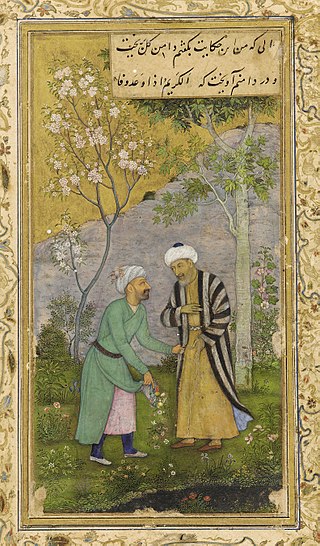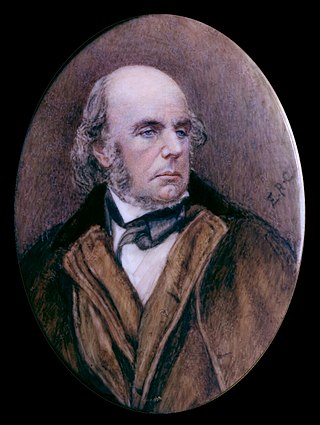A quatrain is a type of stanza, or a complete poem, consisting of four lines.

Rubáiyát of Omar Khayyám is the title that Edward FitzGerald gave to his 1859 translation from Persian to English of a selection of quatrains attributed to Omar Khayyam (1048–1131), dubbed "the Astronomer-Poet of Persia".
Ghiyāth al-Dīn Abū al-Fatḥ ʿUmar ibn Ibrāhīm Nīsābūrī, commonly known as Omar Khayyam, was a Persian polymath, known for his contributions to mathematics, astronomy, philosophy, and poetry. He was born in Nishapur, the initial capital of the Seljuk Empire, and lived during the period of the Seljuk dynasty, around the time of the First Crusade.

Khājeh Shams-od-Dīn Moḥammad Ḥāfeẓ-e Shīrāzī, known by his pen name Hafez or Hafiz, was a Persian lyric poet whose collected works are regarded by many Iranians as one of the highest pinnacles of Persian literature. His works are often found in the homes of Persian speakers, who learn his poems by heart and use them as everyday proverbs and sayings. His life and poems have become the subjects of much analysis, commentary, and interpretation, influencing post-14th century Persian writing more than any other Persian author.

A rubāʿī or chahārgāna is a poem or a verse of a poem in Persian poetry in the form of a quatrain, consisting of four lines.

Persian literature comprises oral compositions and written texts in the Persian language and is one of the world's oldest literatures. It spans over two-and-a-half millennia. Its sources have been within Greater Iran including present-day Iran, Iraq, Afghanistan, the Caucasus, and Turkey, regions of Central Asia, South Asia and the Balkans where the Persian language has historically been either the native or official language. For example, Rumi, one of the best-loved Persian poets, born in Balkh or Wakhsh, wrote in Persian and lived in Konya, at that time the capital of the Seljuks in Anatolia. The Ghaznavids conquered large territories in Central and South Asia and adopted Persian as their court language. There is thus Persian literature from Iran, Mesopotamia, Azerbaijan, the wider Caucasus, Turkey, Pakistan, Bangladesh, India, Tajikistan and other parts of Central Asia, as well as the Balkans. Not all Persian literature is written in Persian, as some consider works written by ethnic Persians or Iranians in other languages, such as Greek and Arabic, to be included. At the same time, not all literature written in Persian is written by ethnic Persians or Iranians, as Turkic, Caucasian, Indic and Slavic poets and writers have also used the Persian language in the environment of Persianate cultures.

Hossein Mohyeddin Ghomshei better known as Elahi Ghomshei, is an Iranian scholar, philosopher, author, and lecturer on literature, art, and mysticism.

Baba Tahir or Baba Taher Oryan Hamadani was an 11th-century dervish poet from Hamadan, Iran who lived during the reign of Tugril of the Seljuk dynasty over Iran. This is almost all that is known of him as he lived a mysterious lifestyle. Although prefix "Baba" has been thought as part of his name in all known sources, his nickname "Oryan" did not appear until about 17th-century. The nickname was probably attributed to him because he seemed to lead a very spiritual and stoic lifestyle and thus was figuratively not clothed with worldly and material needs. His poetry is written in the Hamadani dialect of the Persian language. According to L. P. Elwell-Sutton he probably wrote in the Hamadani dialect, adding: "Most traditional sources call it loosely Luri, while the name commonly applied from an early date to verses of this kind, Fahlaviyat, presumably implies that they were thought to be in a language related to the Middle Persian language. Rouben Abrahamian however found a close affinity with the dialect spoken at the present time by the Jews of Hamadan." According to The Cambridge History of Iran, Baba Tahir spoke a certain Persian dialect.

Peter William Avery was an eminent British scholar of Persian and a Fellow of King's College, Cambridge.

Abu Nazar ʿAbdul ʿAziz bin Mansur ʿAsjadi was a 10th-11th century royal Persian poet of the Ghaznavid empire located in the Ghazni province of today's Afghanistan.
Persian mysticism, or the Persian love tradition, is a traditional interpretation of existence, life and love, reliant upon revelatory and heart-felt principles in reasoning. Though partially sourced from the mystical Zoroastrian traditions of the Persian Empire, in its contemporary practical aspects it is now synonymous with Sufism in contemporary Iran.

Saadi Shīrāzī, better known by his pen name Saadi, also known as Sadi of Shiraz, was a Persian poet and prose writer of the medieval period. He is recognized for the quality of his writings and for the depth of his social and moral thoughts.

Gulistān, sometimes spelled Golestan, is a landmark of Persian literature, perhaps its single most influential work of prose. Written in 1258 CE, it is one of two major works of the Persian poet Sa'di, considered one of the greatest medieval Persian poets. It is also one of his most popular books, and has proved deeply influential in the West as well as the East. The Gulistan is a collection of poems and stories, just as a rose-garden is a collection of flowers. It is widely quoted as a source of wisdom. The well-known aphorism still frequently repeated in the western world, about being sad because one has no shoes until one meets the man who has no feet "whereupon I thanked Providence for its bounty to myself" is from the Gulistan.

Hatim al-Tai, full name Ḥātim bin ʿAbd Allāh bin Saʿd aṭ-Ṭāʾiyy was an Arab Christian knight, chieftain of the Tayyi tribe of Arabia, ruler of Shammar, and poet who lived in the last half of the sixth into the beginning of the seventh century. Although he was considered a well-established poet in his time, today he is best known for his altruism. Stories about his extreme generosity have made him an icon among Arabs up until today, as evident in the proverbial phrase "more generous than Hatim". Additionally, he is known to be a model of Arab manliness.

Edward FitzGerald or Fitzgerald was an English poet and writer. His most famous poem is the first and best-known English translation of The Rubaiyat of Omar Khayyam, which has kept its reputation and popularity since the 1860s.

Samarkand, written by French-Lebanese writer Amin Maalouf, is a 1988 historical fiction novel that revolves around the 11th-century Persian poet Omar Khayyám and his poetry collection Rubaiyat. The novel received the Prix Maison de la Presse.

Ahmed Sudi, also known as Sudi-yi Bosnawi, was a 16th-century Bosnian commentator under the Ottoman Empire. He was the author of several Ottoman Turkish commentaries on Persian classics such as the Masnavi of Rumi, the Gulistan and Bostan of Saadi Shirazi, and The Divān of Hafez. According to Professor of Persian and Islamic studies Hamid Algar, Sudi is "perhaps the most prominent of all Ottoman Persianists".
Zhang Hongnian was a Chinese translator who had been honored by the Iranian Government.
Roknābād or Ruknābād is the name of a district on the north-east side of Shiraz, Iran, watered by a man-made stream of the same name. It was made famous in English literature in the translations of the 14th-century Persian poet Hafez made among others by Gertrude Bell, who wrote (1897):
Shirazi Turk is a ghazal by the 14th-century Persian poet, Hāfez of Shiraz. It has been described as "the most familiar of Hafez's poems in the English-speaking world". It was the first poem of Hafez to appear in English, when William Jones made his paraphrase "A Persian Song" in 1771, based on a Latin version supplied by his friend Károly Reviczky. Edward Granville Browne wrote of this poem: "I cannot find so many English verse-renderings of any other of the odes of Ḥafiẓ." It is the third poem in the collection of Hafez's poems, which are arranged alphabetically by their rhymes.














